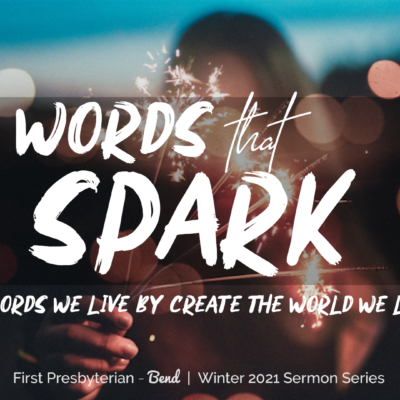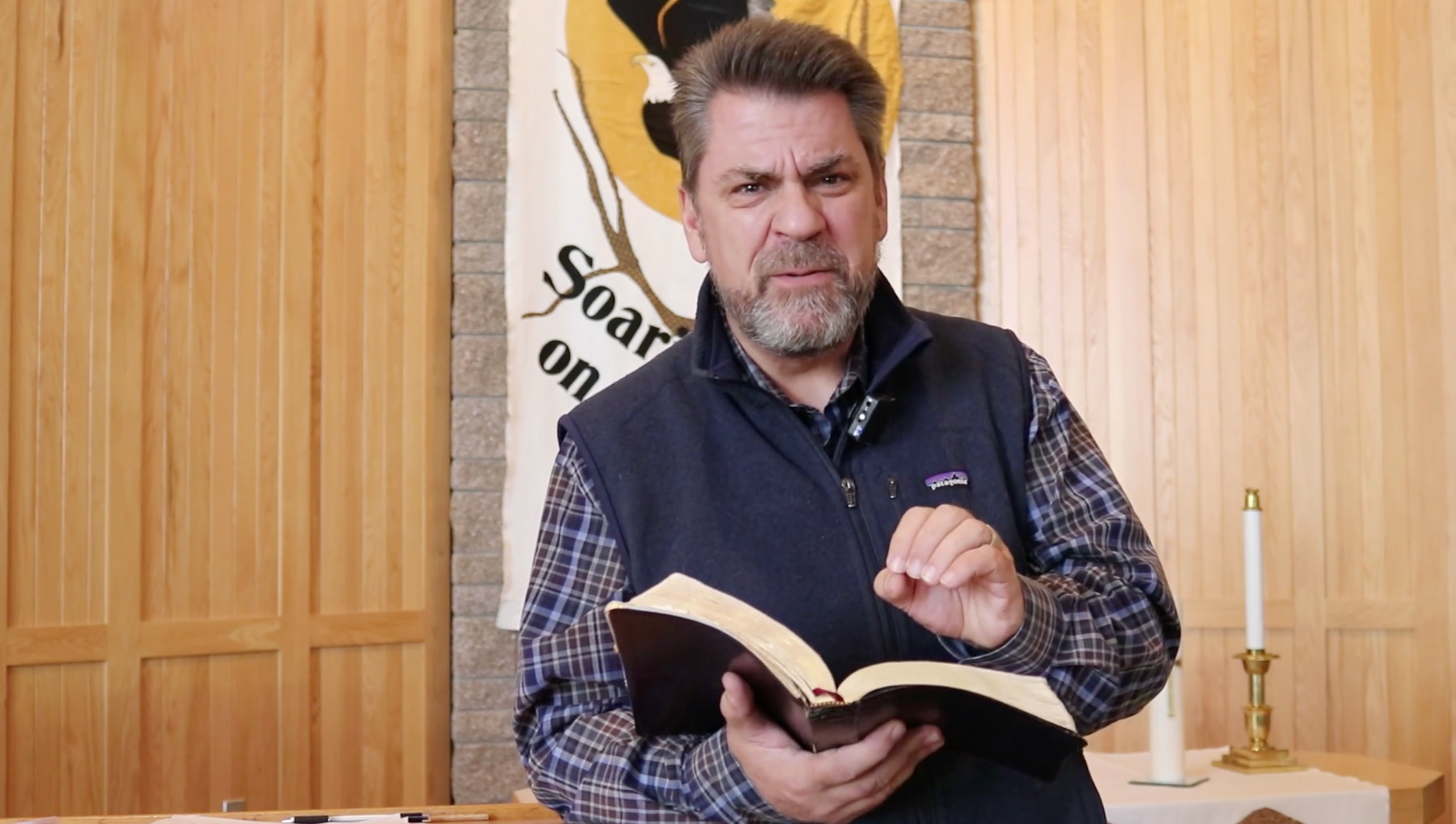Feb 7 Sermon, Words that spark: Release. by Rev. Dr. Steven Koski
A Part of the Series:
Rev. Dr. Steven Koski
Other Articles in:
Feb 7 Sermon, Words that spark: Release. by Rev. Dr. Steven Koski
A couple of years ago, a woman came into the office midweek and she asked if she could come into the the sanctuary, which was empty, and scream. She said she was looking for a safe and sacred space to hold her screams. She said she feared she would harm herself and and maybe harm others if she didn’t find a way to release all that was was bottled up inside her, just ready to explode. You know, of course, we said yes, go ahead, but I asked if I could just wait outside in our Commons area just just to make sure that she was OK.
So she came into the sanctuary. She stood in the middle of the empty sanctuary. And screamed and I mean screamed for a couple of minutes. And when she was done, I asked if she wanted wanted someone to talk to, I asked if I could pray with her.
And she said “no. I just prayed. Thanks for letting me use this space, and as she left”. I couldn’t help but thinking, you know, I can’t I can’t imagine. A holier use of our sanctuary. Jesus cried out in anguish, in anguish from the cross, “my God, my God, why have you forsaken me?” Now, I’m guessing all of us. All of us in one way or another, at some point in our lives. Have prayed that prayer.
You know, our our screens, our screens. And even the silent screams that are in the form of tears on our cheeks. You know. They’re perhaps. Our most honest prayers. And maybe even our most helpful prayers.
You know, our faith isn’t isn’t an epidural to numb the pain of life. Our faith isn’t a magic pill that will somehow make all of the pain go away. What if our faith? What if our faith was the container that is able to hold even the ugliest of our emotions?
The wisdom writer in Ecclesiastes. Said there is a time to laugh. And. There is a time to cry. You know, sometimes sometimes the healing begins. When we have space to… to name our pain, to to feel our pain. To express our pain, to let the tears flow. Don’t be afraid, don’t be afraid of the release of tears. Be afraid when our hearts have become so defended that there are no tears to cry.
Father Greg Boyle said. When you are the enemy of your own pain, you’re more likely to dismiss and despise the pain of others. Parker Palmer said violence more often than not, violence, especially violence inflicted by men happens when we don’t know what else to do with our suffering.
In the middle of the Bible, in the very middle of the Bible, there’s a pretty short book. It’s called Lamentations and it’s a book of five poems. Five poems that are that are brutally honest poems that that expressed that grief and the heartache of a community.
Now, Jerusalem was was completely destroyed by the Babylonians about the year five hundred B.C. and most survivors were hauled away to exile. And some survivors, particularly those women and children, and those who were lame and blind and fragile and weak, they were left behind. They were left behind to wander among the ruins of of the city they once knew, that was now ruined. And scholars believed, the scholars believe that it was it’s actually those left behind wandering among the ruins and the rubble that wrote these brutally honest poems.
The places where they once found comfort and security, gone. Doesn’t that feel just a little bit familiar right now? The places where we once found comfort and security, gone. So this book of lamentations, this invitation to lament the very first chapter, the very first verse says, the city that was once full of people, how lonely the city sits, that was once full of people, the city that was once great is now a widow weeping bitterly in the night, tears on her cheek with no one to comfort her.
I think what this book of lamentations, what this poetry can teach us is sometimes the most the most faithful thing you can do, sometimes the most, most healing thing you can do is to be brutally honest. And lament to feel your pain and express your pain.
You know, when life threatens to overwhelm us, there’s there’s no app on our watch or on our phone that that will help us make sense of it all. That will make it all go away.
But suffering…. suffering and pain is not an intellectual exercise. That’s why the question why, you know the question know why, why, why, why is this happening to me? That’s why that question never satisfies. That’s why statements like “well, God won’t give you more than you can handle”. Statements like that are rarely helpful or or comforting. Pain or suffering is not something for analysis, it calls for expression… Release.
I had a conversation with somebody this week who began our conversation by apologizing. She said, “I’m so sorry. Life is just so hard right now. I’m sorry, I’m just not OK”. What’s wrong with us that we feel like we have to apologize for being human?
I mean, life is hard life. Life is damn hard right now, struggling, feeling all of the feelings that we are feeling doesn’t require an apology, it requires grace, compassion, mercy. And I’d like us to take a moment, to take a moment to just kind of take in… Think about all that we’ve had to endure just in the last 11 months. The trauma that each and every single one of us in our own way has had to endure in the last 11 months.
You’ve had to face an unprecedented health crisis that has paralyzed the planet without any warning whatsoever, you’ve had to alter pretty much the way you do absolutely everything. Travel has become restricted. Maybe you’ve lost income, maybe you’ve lost your job. On top of everything else that you do. Maybe you’ve had to add the job description of home school teacher on top of that.
We’ve had to celebrate birthdays and graduations and other really important milestones through the jittery connection of Zoom. Heck, we had to ask ourselves, what the heck is Zoom? And how do you connect to this again? We’ve had to endure this relentless barrage of breaking news that pretty much has assaulted our spirits on an hourly basis. You’ve had to explain to your kids why they can’t play with their friends and why that somehow isn’t punishment.
You’ve endured endured terrible.,Terrible isolation and loneliness. You’ve watched the death toll rise to unimaginable, unimaginable numbers. You’ve witnessed or maybe even experienced friendships end because of politics. We have witnessed our country being threatened to end, because of politics.
We’ve all witnessed more than one black man murdered on the street. We’ve witnessed the the attack on the nation’s capital, we’ve witnessed truth continuing to be attacked.
Maybe we’ve witnessed our own mental health deteriorate where we feel there are some days, maybe even some hours that we’re hanging by a thread. You haven’t been able to experience the comfort of gathering in person to worship with your community and be strengthened by that. And you’ve endured all of that. And you’ve endured all of that on top of whatever it is that you were you were enduring before this trauma took place over the last 11 months, and you’ve endured all of that with a mask on your face. Without human touch. Or a single hug.
Yes, yes, life is hard. And if you’re surviving.. If you’re as we say, if you’re hanging in there that doesn’t require an apology, that requires applause. Survival these days is victory.
So, yes. Scream, yell. Yell at God, curse at God if you need to. Run, paint, sing, write, make music, cry. Cry, big ugly tears without apology. All of that is prayer. The best kind of prayer.
You know, whether it be sadness or rage or fear or grief, whatever emotions threaten to overwhelm you, don’t deny it, don’t minimize it, don’t try to bury those emotions.
Don’t allow those feelings, don’t allow the pain. To settle into your bones. Name your pain. Feel your pain, express your pain. Release your pain.
Do you know the beautiful thing about lament that we find in the Bible? Lament is a form of prayer. Lament isn’t simply venting our emotions. Lament is, turning toward God and trusting God with our emotions when we’re tempted to turn away from God. Lament is trusting that God is the container that can hold our rage and our sorrow. The book of lamentations, it begins just brutally honest, expressing such such anguish and grief.
But the very same writer in Chapter three says God’s compassion never fails. God’s mercy comes fresh every morning. So on one hand, there’s this expression of pain and on the other hand, God’s mercy comes fresh every morning. So maybe our faith isn’t the promise that we’ll be rescued from the painful realities of life. Maybe the promise is that we are never alone in our suffering. Maybe the promise is that our suffering, our pain will never have the last word.
The Psalmist in his lament said, “I may weep the whole night long. But I trust Joy will come in the morning”.
Amanda Gorman, in her poem that inspired so many, said said, let the globe, if nothing else, say this is true, that even as we grieved we grew. Even as we hurt. We hope. Brenae Brown said, as I look back, the most beautiful things in my life are those times when I’ve come out from underneath what I didn’t know I could come out from underneath. She said, As I look back on my life, I’ve been able to say “there, those are the moments that made me and they were always moments of pain and struggle”.
You know, God, God hasn’t caused the breakdown of our world in our lives. But I believe God is creating in us something beautiful for having been broken.
Mercy comes fresh every morning. Compassion never fails. That’s the container, that that holds our pain, our grief our tears. There is a time to laugh. There is a time to weep. And our tears… Our tears are sacred, our tears are holy. Our tears water the seeds of hope. For that day that will come when we will laugh together.
May it be so.


